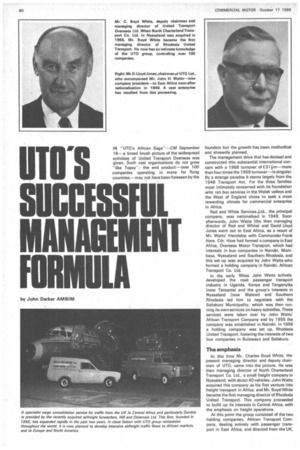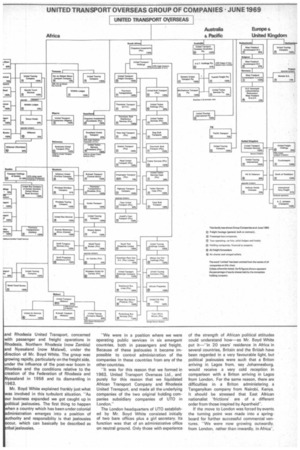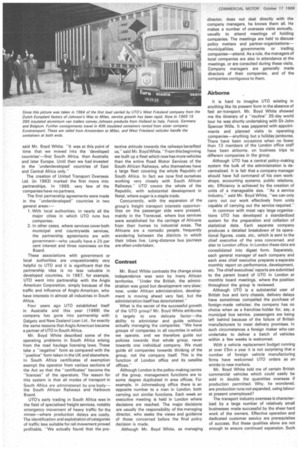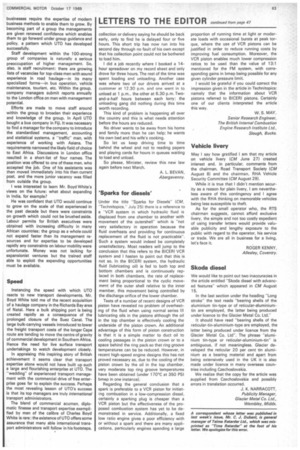ulos
Page 62

Page 63

Page 64

Page 65

If you've noticed an error in this article please click here to report it so we can fix it.
SUCCESSFUL MANAGEMENT FORMULA
IN "UTO's African Saga"—CM September 19 a broad brush picture of the widespread activities of United Transport Overseas was given. Such vast organizations do not grow "like Topsy''; the end product—over 100 companies operating in many far flung countries—may not have been foreseen by the founders but the growth has been methodical and shrewdly planned.
The management drive that has devised and constructed this substantial international concern with a 1968 turnover of £314-m—more than four Limes the 1959 turnover—is singular. By a strange paradox it stems largely from the 1948 Transport Act. For the three families most intimately concerned with its foundation who ran bus services in the Welsh valleys and the West of England chose to seek a more rewarding climate for commercial enterprise in Africa.
Red and White Servicesltd.. the principal company, was nationalized in 1949. Soon afterwards, John Watts (the then managing director of Red and White) and David Uoyd Jones went out to East Africa, as a result of Mr. Warts friendship with Commander Frank Hare. Cdr. Hare had formed a company in East Africa, Overseas Motor Transport, which had interests in bus companies in Nairobi, Mombasa, Nyasaland and Southern Rhodesia, and this set-up was acquired by John Watts who formed a holding company in Nairobi, African Transport Co. Ltd.
In the early 'fifties John Watts actively developed the road passenger transport industry in Uganda, Kenya and Tanganyika (now Tanzania) and the group's interests in Nyasaland (now Malawi) and Southern Rhodesia led him to negotiate with the Salisbury Municipality, which was then running its own services on heavy subsidies. These services were taken over by John Watts' African Transport Company and by 1955 the company was established in Nairobi. In 1956 a holding company was set up, Rhodesia United Transport, fostering the interests of two bus companies in Bulawayo and Salisbury.
The emphasis
At this time Mr. Charles Boyd White, the present managing director and deputy chairman of UTO, came into the picture. He was then managing director of North Charterland Transport Co. Ltd., a small freight company in Nyasaland, with about 40 vehicles. John Watts acquired this company as his first venture into freight transport in Africa, and Mr. Boyd White became the first managing director of Rhodesia United Transport. This company proceeded to build up its interests in Central Africa, with the emphasis on freight operations.
At this point the group consisted of the two holding companies, African Transport Company, dealing entirely with passenger transport in East Africa, and directed from the UK, and Rhodesia United Transport, concerned with passenger and freight operations in Rhodesia, Northern Rhodesia (now Zambia) and Nyasaland (now Malawi), under the direction of Mr. Boyd White. The group was growing rapidly. particularly on the freight side, under the influence of the post-war boom in Rhodesia and the conditions relative to the creation of the Federation of Rhodesia and Nyasaland in 1956 and its dismantling in 1963.
Mr. Boyd White explained frankly-just what was involved in this turbulent situation. ''As our business expanded we got caught up in political jealousies. The first thing to happen
['hen a country which has been under colonial dministration emerges into a position of uthority and responsiblity is that jealousies ccur, which can basically be described as ribal jealousies. -We were in a position where we were operating public services in six emergent countries, both in passengers and freight. Because of these jealousies it became impossible to control administration of the companies in these countries from any of the other countries.
-It was for this reason that we formed in 1963. United Transport Overseas Ltd., and purely for this reason that we liquidated African Transport Company and Rhodesia United Transport, and made all the underlying companies of the two original holding companies subsidiary companies of UTO in London."
The London headquarters of UTO established by Mr. Boyd White consisted initially of two bare offices plus a girl secretary. Its function was that of an administrative office on neutral ground. Only those with experience
of the strength of African political attitudes could understand how—as Mr. Boyd White put it--in 20 years' residence in Africa in several countries. Britain and the British have been regarded in a very favourable light, but political jealousies were such that a Briton arriving in Lagos from, say Johannesburg, would receive a very cold reception in comparison with a Briton arriving in Lagos from London. For the same reason, there are difficulties in a Briton administering a Tanganyikan company from Nairobi, Kenya. It should be stressed that East African nationalist 'frictions' are of a different order from those inspired by Apartheid".
If the move to London was forced by events the turning point was made into a springboard for further successful commercial ventures. We were now growing outwardly, from London, rather than inwardly, in Africa-, said Mr. Boyd White. "It was at this point of time that we moved into the 'developed countries"—first South Africa, then Australia and later Europe. Until then we had invested in the 'underdeveloped' countries of East and Central Africa only."
The creation of United Transport Overseas Ltd. in 1963} marked the first move into partnerships. In 1969, very few of the companies have no partners.
The first partnership agreements were made in the "underdeveloped" countries in two general areas: 1. With local authorities, in nearly all the major cities in which UTO runs bus companies.
2. In other cases, where services cover both municipal and countrywide services, the partnership agreements are with government who usually have a 25 per cent interest and three nominees on the Board.
These associations with government or local authorities are unquestionably very helpful to UTO and it is significant that the partnership idea is no less valuable in developed countries. In 1967, for example, UTO went into partnership with the Anglo American Corporation, simply because of the traffic and influence of Anglo-American, who have interests in almost all industries in South Africa.
Four years ago UTO established itself in Australia and this year (1969) the company has gone into partnership with Dalgety and New Zealand Loan Ltd.. for exactly the same reasons that A ng lo American became a partner of UTO in South Africa,
Mr. Boyd White described some of the operating problems in South Africa arising from the road haulage licensing laws. These take a "negative" form as compared with the "positive" form taken in the UK and elsewhere. In South Africa certificates of exemption exempt the operator from various sections of the Act so that the "certificates" become the "licencesof the operators. The reason for this system is that all modes of transport in South Africa are administered by one body— the South African Railways and Harbours Board.
UTO's early trading in South Africa was in the field of specialized freight services, notably emergency movement of heavy traffic for the mines—where production delays are costly. The identification and exploitation of categories of traffic less suitable for rail movement proved profitable. "We actually found that the pro
tective attitude towards the railways benefited us," said Mr. Boyd White. "From this beginning we built up a fleet which now has more vehicles than the entire Road Motor Services of the South African Railways, who themselves have a large fleet covering the whole Republic of South Africa. In fact we now find ourselves working very closely with South African Railways." UTO covers the whole of the Republic, with substantial development in Natal, where sugar is a staple trade.
Concurrently, with the expansion of the group's freight transport interests opportunities on the passenger side were pressed, mainly in the Transvaal, where bus services were established for the carriage of Africans from their homes to industrial areas, The Africans are a nomadic people, frequently wandering between the districts in which their tribes live. Long-distance bus journeys are often undertaken.
Contrast
Mr. Boyd White contrasts the change since independence was won by many African territories. "Under the British, the administration was good but development very slow; now, under African administration, development is moving ahead very fast, but the administration itself has deterioriated."
What is the secret of the successful growth of the UTO group? Mr. Boyd White attributes it largely to one delicate factor—the ability to administer and guide without actually managing the companies. "We have groups of companies in all countries in which we operate, and we therefore guide our policies towards that whole group, never towards one individual company. We must guide all companies towards thinking of the group, not the company itself. This is the function of London office and its satellite offices."
Although London is the policy-making centre of the group, management functions are to some degree duplicated in area offices. For example, in Johnnesburg office there is an opposite number to a man in London, both carrying out similar functions. Each week an executive meeting is held in London where decisions are reached. The major decisions are usually the responsibility of the managing director, who seeks the views and guidance of those concerned before the final policy decision is made.
Although Mr. Boyd White. as managing director, does not deal directly with the company managers. he knows them all. He makes a number of overseas visits annually, usually to attend meetings of holding companies. The meetings are held to discuss policy matters and partner-organizations-municipalities, governments or trading companies—attend. As a rule, the managers of local companies are also in attendance at the meetings, or are consulted during these visits. Company managers are generally made directors of their companies, and of the companies contiguous to them.
Airborne
It is hard to imagine UTO existing in anything like its present form in the absence of fast air-transport. Mr. Boyd White showed me the itinerary of a "routine" 35-day world tour he was shortly undertaking with Sir John Spencer Wills. It was peppered with appointments and planned visits to operating companies—anything but a holiday jamboree. There have been occasions when no fewer than 13 members of the London office staff have been airborne, on business trips to different companies in the group.
Although UTO has a central policy-making system the bulk of the administration is decentralized. It is felt that a company manager should have full command of his own workshops, accounting systems, public relations, etc. Efficiency is achieved by the creation of units of a manageable size. "As a service industry," said Mr. Boyd White, "we can only carry out our work effectively from units capable of carrying out the service required."
In common with most very large organizations UTO has developed a standardized system for the preparation and collation of statistical data. Each separate company produces a detailed breakdown of its operational figures, costs, etc., which is sent to the chief executive of the area concerned, and also to London office. In London these data are consolidated into digest form. Separately, each general manager of each company and each area chief executive prepares a separate monthly report on performance, development, etc. The chief executives' reports are submitted to the parent board of UTO in London at monthly board meetings, where the position throughout the group is reviewed.
Although UTO is a substantial user of British bus and lorry chassis, delivery delays have sometimes compelled the purchase of foreign-made vehicles; the company has no choice when as a franchise-holder for, say, a municipal bus service, passengers are being left behind because of the failure of British manufacturers to meet delivery promises. In such circumstances a foreign maker who can undertake to deliver a batch of vehicles within a few weeks is welcomed.
With a vehicle replacement budget running at over £5m a year it is not surprising that a number of foreign vehicle manufacturing firms have welcomed UTO orders as an entrée to new markets.
Mr. Boyd White told me of certain British commercial vehicles which could easily be sold in double the quantities overseas if production permitted. Why, he wondered, are production runs not expanded, using labour at present unemployed?
The transport industry overseas is characterized by a large number of relatively small businesses made successful by the sheer hard work of the owners. Effective operation and dedicated customer service are prerequisites of success. But these qualities alone are not enough to ensure continued expansion. Such businesses require the expertise of modern business methods to enable them to grow. By becoming part of a group the managements are given renewed confidence which enables them to go forward under group guidance and policy, a pattern which UTO has developed successfully.
Staff development within the 100-strong group of companies is naturally a serious preoccupation of higher management. So. also, is staff recruitment: there are growing lists of vacancies for top-class men with sound experience in road haulage—in its many specialized forms—in bus operation, vehicle maintenance, tourism, etc. Within the group, company managers submit reports annually to the London office on men with management potential.
Efforts are made to move staff around within the group to broaden their experience and knowledge of the group. In April UTO bought a bus company in Fiji. It was necessary to find a manager for the company to introduce the standardized management, accounting and statistical systems. a ''traffic" man, with experience of working with Asians. The requirements narrowed the likely field of choice to East Africa. Discussions in London office resulted in a short-list of four names. The position was offered to one of these men, who accepted the job. One of his assistants was then moved immediately into his then current post, and the more junior vacancy was filled from outside the group.
I was interested to learn Mr. Boyd White's views on the future: what about expanding in India, for example?
He was confident that UTO would continue to grow on the scale of that experienced in the past decade but there were constraints on growth which could not be brushed aside. Labour permits for British executives were obtained with increasing difficulty in many African countries: the group as a whole could not expand faster than its management resources and for expertise to be developed rapidly any constraints on labour mobility were unfortunate. Money was not lacking for expansionist ventures but the trained staff able to exploit the expanding opportunities must be available.
Speed
Instancing the speed with which UTO reacts to new transport developments, Mr. Boyd White told me of the recent acquisition of a haulage company in the Richards Bay area of Natal. Here a bulk shipping port is being created rapidly as a consequence of the prolonged closure of the Suez Canal. The large bulk-carrying vessels introduced to lower the freight transport costs of the longer Cape route are tending to move the centre of gravity of commercial development in Southern Africa. Hence the need for live surface transport undertakings to watch development closely.
In appraising this inspiring story of British achievement it seems clear that transport expertise alone would not have built up such a large and flourishing enterprise at UTO. The "weddingof experienced transport management with the commercial drive of free enterprise goes far to explain the success. Perhaps the most revealing lesson of UTO's success is that its top managers are truly international transport administrators.
The blend of commercial acumen, diplomatic finesse and transport expertise exemplified by men of the calibre of Charles Boyd White is rare ; the existence of UTO offers some assurance that many able international transport administrators will follow in his footsteps.




























































































































